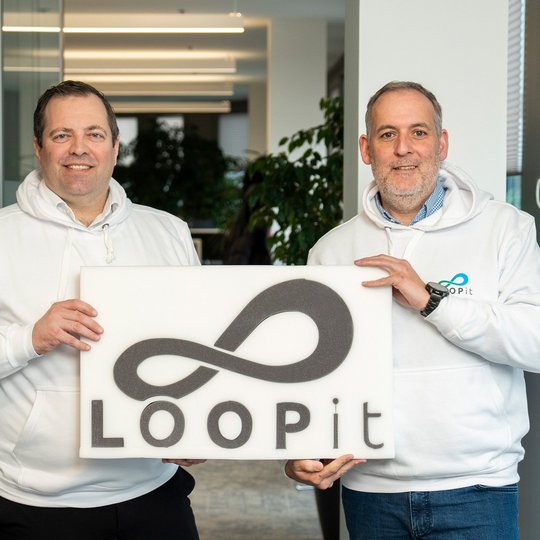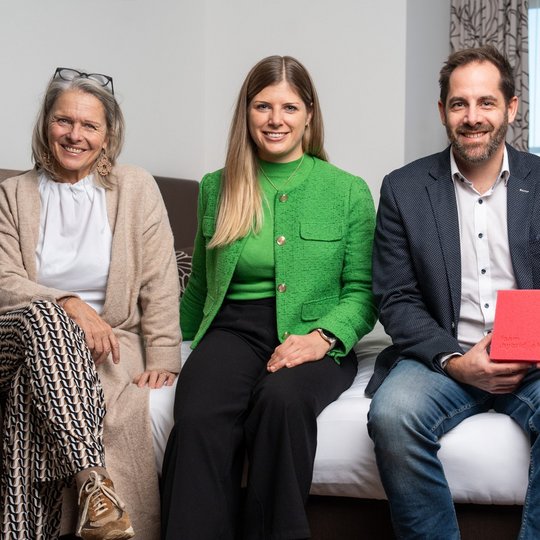The ambitious i+sCabin2.0 research project links the smart aircraft cabin to the ground, allowing airlines to create better cabin reliability and increased passenger comfort through artificial intelligence.
Beginning in 2018, the initial i+sCabin research project conducted by the participating companies and institutions revealed a new data solution in the passenger aircraft cabin. Networked components such as galleys, toilets, seats, surfaces, and overhead bins were enabled with technology to be able to provide and exchange information. For the first time, this created the basis for recording the technical condition of the aircraft cabin at a glance. The results of the initial research project were so promising that the alliance partners quickly agreed to launch a follow-up project.
The approach of the new i+sCabin2.0 research project is to enable sharing of data obtained from the cabin with ground stations during the flight for automated processing and evaluation using artificial intelligence.
A key driver behind this research project is to make air travel even safer and more passenger-friendly. The smart cabin will generate and network comprehensive information from highly developed systems and sensors to provide an updated overall picture of the cabin's condition. Airlines will be able to retrieve this information about the overall cabin environment and make servicing decisions in real time.
This data will also enable new levels of preventive maintenance. A wireless smart cabin network, designed as an open platform, will connect the smart applications, seats, kitchens, toilets and surfaces. The smart applications will identify the current status of systems, and provide an advance prediction of systems that may need to be repaired or replaced. This information will help airlines conduct preventive maintenance to ensure the availability and reliability of the cabin equipment and its many functions.
A smart networked cabin that communicates with the ground can optimize maintenance planning, increase airplane availability, digitize and standardize processes, and ultimately help keep airplanes running on schedule and passengers satisfied with their flying experiences.
Other applications are in development to connect passengers and flight attendants. These new functions will significantly improve comfort, service and cabin processes, by anticipating passengers' needs.
Under the joint leadership of the German aerospace supplier Diehl Aerospace, a large number of companies – even competitors – have joined forces to work on achieving these ambitious goals. Industrial alliance partners are Bühler Motor Aviation GmbH, Diehl Aerospace (alliance leader), Diehl Aviation, Jeppesen GmbH, Safran Cabin Germany GmbH and Thales Deutschland GmbH. The Baden-Wuerttemberg Cooperative State University and the Hamburg University of Technology are involved as scientific alliance partners. Subcontractors are ANS GmbH, Fraunhofer Institute for Reliability and Microintegration, LightnTec GmbH, SWMS Systemtechnik Ingenieurgesellschaft, Technical University of Darmstadt, Technische Universität Dresden, TUTECH Innovation GmbH, and Zentrum für Angewandte Luftfahrtforschung GmbH.
Associate partners are Airbus Operations GmbH, ANS GmbH, The Boeing Company, NEVEON Austria GmbH, and Thales.
++++++
Work Package NEVEON
NEVEON is involved in three work packages in the i+sCabin2.0 research project as an associated partner.
Work Package: Intelligent cabin functions - smart boarding
Various sensors and sensor networks installed in NEVEON seat cushions enable the monitoring of passenger movement. For example, it is possible to see when passengers take or leave their seats. The seat sensor data thus collected serves to optimize the boarding process and hence the flight, which means that the interval between landing and the next takeoff can be minimized.
Work Package: Intelligent data ecosystems - data transmission from the cabin to the maintenance system
The objective is to create a data transmission chain from the aircraft cabin to the corresponding airport control center and in particular, to the maintenance systems or infrastructure of the aircraft manufacturer, OEM or airline.
Work Package: Artificial intelligence for cabin systems – preventive maintenance of seats
This work package addresses preventive maintenance in cabin installations such as the water, wastewater, seat adjustment, ventilation and galley subsystems. Integration of the GREINER Intelligent Seat, which is a seat cushion equipped with sensors, facilitates the collation of data regarding matters such as seating comfort or the expected lifetime of comfort materials. Using appropriate algorithms, this data is then utilized in different application environments (seating, cabin, maintenance system). The challenge in this respect lies in the support of the differing platforms of the partners involved.
++++++
The i+sCabin2.0 research project started at the beginning of 2022. The first research results are expected in the middle of 2023. It is intended to make the central innovations presentable and tangible in a technology demonstrator.
i+sCabin2.0 is supported by funding from the German Federal Ministry of Economic Affairs and Climate Action (BMWK).
![[Translate to Englisch:] [Translate to Englisch:]](/fileadmin/_processed_/7/3/csm_Smart_Cabin_220615_image_icabin_1200x1200_c2f56aeac3.png)




